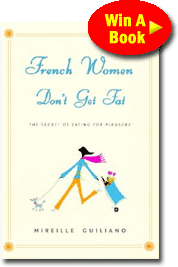|
|
(back to page 2)
I begin with my childhood in France and then share my experience as a young woman with a weight challenge. Faced with the first physical wake-up call of my life, I turned to traditional French principles for help. By sharing my experience not only with food, but with a "total approach" to healthy living, I aim to guide each reader toward finding her own "equilibrium." ("Le mot juste" indeed: it's an important concept, because while our bodies are machines, no two are built exactly alike, and they "reset" themselves repeatedly over time. A program that doesn't evolve with you will not see you through the long run.) I provide menus you can follow exactly, but the goal is to develop what works for you as you cultivate a new intuition. I'm not presenting prescriptions so much as templates. Tailor them according to your preferences, paying attention to your own body, schedule, environment, and other unique characteristics. In fact, my emphasis is on the simplicity, flexibility, and "rewards" of doing it yourself. This fine-tuning can't be done by a doctor-author who's never met you.
As I recount my own story from adolescent meltdown to rescue to a new approach that has worked for decades and counting, I lay out a path for you. I take readers through a complete program:
Phase one, "wake-up call:" an old-fashioned three-week inventory of meals. A clear-eyed look at what you're eating, which itself, even after a couple of days, can begin your turn-around.
Phase two, "recasting:" an introduction to the French school of portions and diversity of nourishment. You'll identify and temporarily suspend some key food "offenders." This is usually a three-month process, though for some a month will do the trick. It won't be a dietary boot camp, merely a chance for your body to recalibrate. There is discipline, but flexibility is vitally important, especially at this key motivational stage: the value of avoiding routine both in meals and in activities, emphasizing quality over quantity. No pizza three days in a row, but also no three hours at the gym on Saturday. You'll acclimate with your five senses to a new gastronomy (a Greek word, even before it was a French one, meaning "rules of the stomach"). Three months is not a short time, but neither is it long for something you'll never need to do again. Naturally, it takes longer to reset your body's dials than to lose seven pounds of water, the initial part of many extremist diets. But because it is French, there will be pleasures, lots of them.
Phase three, "stabilization:" a stage wherein everything you like to eat is reintegrated in proper measure. You have already achieved your reset "equilibrium" and should be at least halfway toward your weight-loss goal. Amazingly, at this point you can increase your indulgences and continue to slim down or just maintain your equilibrium if you are already there. I give advice for practicing ideas about seasonality and seasoning, powerful tools and not nearly as much trouble as some imagine. I present more recipes based on the French knack for variations on a theme, or how to make three easy dishes out of one with delicious results, saving time, money, and calories.
Phase four, "the rest of your life:" You are at your target weight, a stable equilibrium, and the rest is just refinements. You know enough about your body and preferences to make little adjustments in the event of any unexpected drifts, especially as you enter new phases of life. Your eating and living habits are by now tailored to your tastes and metabolism, so like a classic Chanel suit, they should last you forever with minor alterations over the years. Now you will be eating in a totally different light, with an intuition to rival that of any French woman—a cultivated respect for freshness and flavor that unlocks the world of sensory delights to be discovered in presentation, color, and variety. What you do you will do for pleasure, not punishment. You'll enjoy chocolate and a glass of wine with dinner. "Pourquoi pas?"
In addition to nourishment, which is the main subject, I'll describe aspects of healthy living that need to be pleasurable as well. As with food, these do not require extreme measures (physical, emotional, intellectual, spiritual, or financial)—only a sense of balance. They include elements of what I like to call French Zen, which can be learned quickly and easily and practiced anywhere (mainly, French women do not go to gyms, but if that is your pleasure, "a chacun son gout!"). Even the French know there is much more to life than eating, so here too you'll find the French take on other diversions, like love and laughter. From beginning to end, it will be important to recognize that Montaigne's "apercu" is more relevant today than ever: A healthy body and healthy mind work together. To maintain both, there is no substitute for "joie de vivre" (an expression for which there is tellingly no American equivalent).
Now I have a few stories to tell, a few dozen, actually. I take pleasure in being a raconteur as well as in eating and drinking.
They will drive home basic concepts, but I hope you will also enjoy them "comme ca." Unlike a diet book, this book doesn't let you flip to graphics and jump right in: you'll have to read it. Learning to eat right is like learning a language—nothing works like immersion.
Let the tale begin.
(continued on the next page)
If you’re enjoying this excerpt and you’d like to sample other books, join our Online Book Clubs.
|
|

|